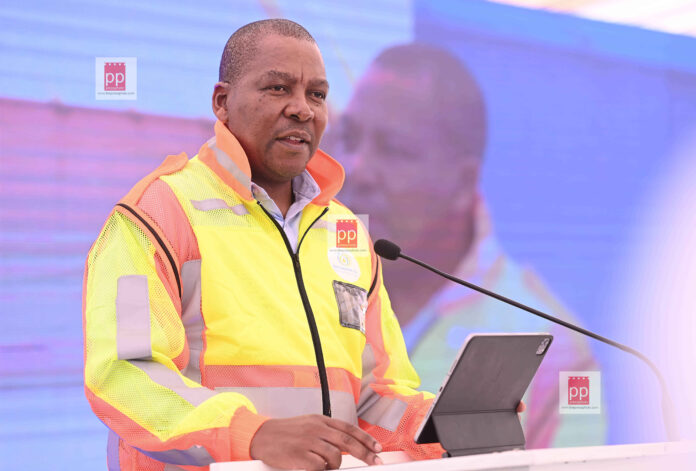
11th October 2024
Sello Motseta
Ministry of Minerals and Energy officials have lauded the completion of the P 315 million structure to enhance the security of the country’s petroleum supplies as a vital cog of national security.
It involved the construction of a road loading and offloading gantry with other associated infrastructure developments, construction of the tank farm, rail offloading facility and office building. P213 million of this budget has been spent on citizen contractors.
The project employing 452 people involved the inclusion of citizen and local companies in Joint Ventures or any form of partnership provides for skills transfer, development and capacity building which makes it easier for these companies to offer maintenance services post completion of the project.
Minister of Minerals and Energy, Lefoko Maxwell Moagi, said “The social and economic benefits of a project such as this one cannot be overemphasized. As a Government we believe that State Owned Enterprises like Botswana Oil should facilitate citizen economic empowerment.”
He said, “Modern UTS NTR JV were awarded the mechanical and electrical construction of this particular contract, the road offloading and loading gantry for the sum of P 81,898,078.63. The main contractor engaged seven (7) sub-contractors, of which five (5) of them were citizen contractors and only two of them were international contractors.”
Phase 2 of the project comprises of civil works and construction of four (4) fuel storage tanks with a total capacity of 60 million litres. The total contract sum for both phase 2 contracts is P 434,662,850.72 and has been awarded to Concor on civil works and Trotech on tank construction.
The Government strategic storage facilities built in Gaborone and Francistown are no longer sufficient to maintain Government’s aim to provide a contingency supply of petroleum products, in line with the Essential Supplies Programme. This is due primarily to the increased consumption of petroleum products since the facilities were built in 1979.
As a result, in 2008 the Government of Botswana through the then Ministry of Minerals, Energy and Water Resources (Department of Energy) engaged a consultant to review the security of supply strategy for the country as well as undertake a feasibility study to expand existing Government Petroleum Reserve Storage Facilities.
The study was then reviewed and updated in 2012 and both studies reviewed the Government’s bulk petroleum product strategic storage programme of maintaining strategic stocks of petrol, diesel, illuminating paraffin and aviation fuels equivalent to 90 days of prevailing consumption in line with the World Bank’s recommendations for a non-oil producing country like us.
Moagi, said “As part of enhancing the security of supply for the country, the studies also recommended the diversification of our routes and sources of supply to reduce concentration risk on the primary route and sources of South African Refineries.”
He said, “In addition, the national demand projections for petroleum products were also studied to establish the national strategic areas for location of the storage facilities. This was then used as a basis for determination of future development of bulk storage facilities in Ghanzi, Francistown and Tshele Hills.”
The Government sanctioned Botswana Oil Limited (BOL) to commence construction of the Francistown Depot expansion for which the groundbreaking was done in September 2022 followed by commencement of construction immediately thereafter.
The Francistown Project was delivered in two (2) phases, and a total of four (4) contracts awarded to different contractors. Phase 1 of the project included mechanical and civil works with a cost of approximately P219 million and it is complete.
The Energy Policy states, “Petroleum products will be sourced and stored in a reliable and sustainable manner to ensure security of supply.”
Therefore, the development of an additional 60 million litres of fuel to complement the current 38 million litres capacity is a clear demonstration of implementing the policy statement. Once complete, the capacity will increase days cover from the current 12 days to 60 days as part of increasing the country overall capacity to the desired 60 days – 90 days cover.
The facility will tremendously contribute to the overall implementation of the 90% Import Mandate that Botswana Oil has been entrusted with. Just a week ago, we officially launched the 90% mandate which provides significant opportunities for growth of the petroleum industry in Botswana.
Botswana Oil, Chief Executive Officer Meshack Tshekedi, said “As we would all be aware, Botswana imports all petroleum products consumed in the country as we do not produce any petroleum products. As a land locked country, this brings some significant security of supply challenges for the country.”
He said, “The Government realizing the critical and strategic importance of petroleum supplies to the national and the prosperity of our economy authorized the establishment of a strategic reserve programme culminating in the construction of two petroleum storage depots many years in 1979.”
One in Gaborone at 25 million litres and the other in Francistown at 38 million litres with the overall objective to keep the petroleum strategic reserves to maintain the economy going for at least 60-90 days should there be any supply disruptions in to the country.
Following the construction and eventual filling, the conditions continued to change with consumption of petrol and diesel steadily increasing and reducing the overall strategic days cover to only 15 days to day.
Tshekedi, said “The Francistown facility is a 38-million-liter storage capacity. It is targeting the North-eastern demand for petroleum products of about 38% of national demand. Francistown is strategically located for importation of products from Mozambique, Matola via Zimbabwe route. Currently, the facility as was built did not have a Road loading and offloading facility.”
The main reasons for Francistown depot expansion project are to accommodate surges in inventories due to intermittent rail tanker arrivals and variation in sales shipments; Allow for unplanned delays in shipments and to make provision for long supply interruptions.








